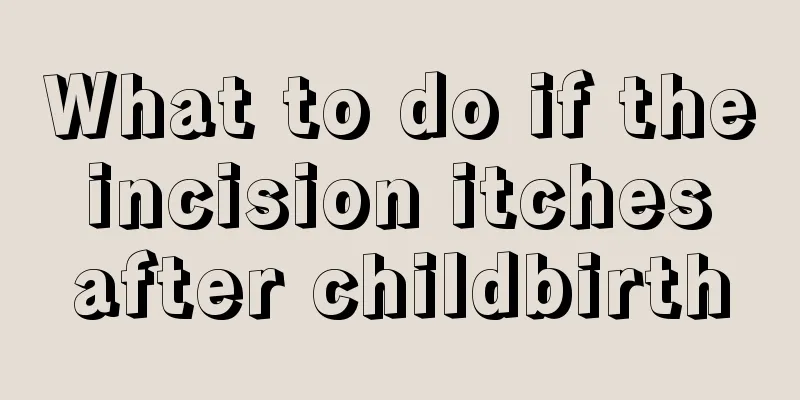What to do if the incision itches after childbirth

|
Postpartum itching of the incision is a very common phenomenon. In such a situation, it is necessary to relieve it. It is normal to itch the incision, and it is very necessary to do some relief work. Many ways can relieve it. It is very good to relieve it to a certain extent, which will be conducive to the recovery and healing of the wound. The healing rate of postpartum incisions is very slow. In this case, the incision will be particularly itchy for a long period of time. It is very important to pay more attention to the changes in your incision and to pay attention to the slightest impact. During such a special period of time, try to avoid the impact of the incision, pay more attention to it, and don't scratch it with your hands. The reason for itching on the incision after cesarean section: Generally speaking, itching on the incision after cesarean section is a normal physiological phenomenon, as new blood vessels and nerves need to grow connective tissue. These new blood vessels and nerves are particularly dense and crowded together. The new nerves are easily stimulated, and because the nerves are very sensitive, they will produce an itchy feeling. Since nerve tissue has poor regeneration ability, generally speaking, when the nerves are about to heal, the wound is also about to heal. As for the itching of cesarean section incision caused by this reason, as long as you can still bear it, generally no special treatment is needed. In particular, you should pay attention to avoid scratching the wound and avoid washing with hot water. This will only aggravate local irritation and cause inflammatory reaction of connective tissue, which will aggravate the itching and even cause infection. If the itching is unbearable, you can gently massage the wound and use some anti-itching drugs at the same time. The hyperplasia period of surgical scars lasts about three months to half a year. The proliferation of fibrous tissue gradually stops and the scars gradually become flatter and softer. The color turns into dark brown, and the scar will become painful and itchy, especially the itching is the most obvious. For some people, the symptoms last for several months to several years after the operation, and sometimes for more than ten years. The wound scars often become itchy, especially when sweating profusely or when the weather changes. The itching is severe, and the scars become more obvious after scratching, but they usually shrink afterwards. In this case, as long as there is no secondary infection, there is no need to go to the hospital for treatment. But if you are a person with a scar-prone constitution, your scars will grow progressively after the operation and form local lumps. At this time, you need to go to the dermatology or plastic surgery department of the hospital for treatment. Methods for dealing with itchy cesarean section wounds: 1. When the cesarean section wound is itchy, be careful not to scratch it, rub it with clothes, or wash the wound with hot water, so as not to aggravate the itching or cause the wound to become infected, thereby delaying wound healing. When the wound itches, you can read a book or do other things to divert your attention. Method 2 for treating itchy cesarean section wounds: A few people’s wounds are obviously itchy due to sweating, weather changes, etc. Under the guidance of a doctor, you can apply anti-inflammatory and anti-allergic ointments, such as dermatitis ointment. Method 3 for dealing with itchy cesarean section wound: Live a regular life, go to bed early, be in a good mood, and exercise moderately. The focus of diet is to eat more fresh vegetables, fruits and mushrooms. Do not eat meat or spicy soup for the time being. Do not eat spicy and irritating food to avoid stimulating scar tissue and causing hyperplasia. As long as you do well, your condition will improve significantly. The above are some methods and ways to deal with itchy incisions. The above methods will reduce the itching to a certain extent. Many methods can be tried to reduce the degree of itching and allow the wound to heal as soon as possible to reach the healthiest level. This can also prevent some postpartum complications related to incisions. Take care of your own health. |
<<: What are the dietary treatments for kidney yang deficiency in women?
>>: What are the sequelae of ectopic pregnancy surgery
Recommend
Vulva itching with tofu dregs picture
The private parts are the most susceptible part o...
【Medical Q&A】What is carrier screening?
Author: Sui Yilun Shanghai Ji'ai Genetics and...
Treatment of hydrosalpinx
Hydrosalpinx and hydrotubation can cause great pr...
What is shrimp paste? What is the nutritional value of shrimp paste?
Shrimp is rich in nutrients, and its meat is soft...
Is brewing tea in a thermos cup toxic and carcinogenic? What food safety experts say
"When people reach middle age, they can'...
What oil should I eat during confinement?
During the confinement period, female friends are...
What are the methods of Chinese medicine for regulating irregular menstruation?
Because of the fast pace of life, work pressure a...
Piper Jaffray: Survey shows Instagram is the most popular social networking site for American teenagers
Instagram is gradually replacing Facebook and Twi...
Can I drink barley tea during menstruation?
It is very normal for women to have menstruation....
How should women take care of their breasts?
Breasts are a place that can reflect a woman'...
Did you know that taking a shower with shower gel can cause breast cancer?
Shower gel is used every day when taking a shower...
What to do if you have pain in your thighs during late pregnancy
Pregnancy will bring various pregnancy reactions....
What is the disease of female left breast pain
Breasts are the symbol of femininity. Healthy bre...
The first injectable male contraceptive has passed clinical trials. Is the era of male contraception just around the corner?
Indian researchers claim to have completed the wo...
What to do with vertigo? Chinese medicine external treatment for vertigo
I don’t know if you have ever had this experience...









